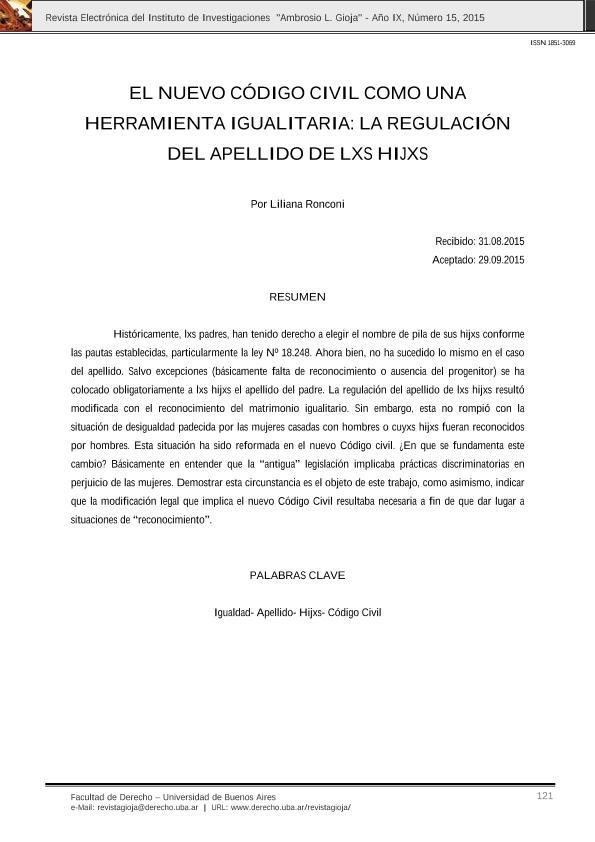Mostrar el registro sencillo del ítem
dc.contributor.author
Ronconi, Liliana Mabel

dc.date.available
2019-03-08T19:39:50Z
dc.date.issued
2015-12
dc.identifier.citation
Ronconi, Liliana Mabel; El nuevo código civil como una herramienta igualitaria: la regulación del apellido de lxs hijxs; Universidad de Buenos Aires. Facultad de Derecho. Instituto de Investigaciones Jurídicas y Sociales Ambrosio L. Gioja; Revista electrónica; 15; 12-2015; 121-134
dc.identifier.issn
1851-3069
dc.identifier.uri
http://hdl.handle.net/11336/71266
dc.description.abstract
The new civil code acting as an equalitary tool: the son´s surname regulationHistóricamente, lxs padres, han tenido derecho a elegir el nombre de pila de sus hijxs conforme las pautas establecidas, particularmente la ley Nº 18.248. Ahora bien, no ha sucedido lo mismo en el caso del apellido. Salvo excepciones (básicamente falta de reconocimiento o ausencia del progenitor) se ha colocado obligatoriamente a lxs hijxs el apellido del padre. La regulación del apellido de lxs hijxs resultó modificada con el reconocimiento del matrimonio igualitario. Sin embargo, esta no rompió con la situación de desigualdad padecida por las mujeres casadas con hombres o cuyxs hijxs fueran reconocidos por hombres. Esta situación ha sido reformada en el nuevo Código civil. ¿En que se fundamenta este cambio? Básicamente en entender que la “antigua” legislación implicaba prácticas discriminatorias en perjuicio de las mujeres. Demostrar esta circunstancia es el objeto de este trabajo, como asimismo, indicar que la modificación legal que implica el nuevo Código Civil resultaba necesaria a fin de que dar lugar a situaciones de “reconocimiento”.
dc.description.abstract
Historically, both parents have had the right to choose the name of their children, under the regulation of the so called “law of name” (No. 18.248). However, this has not been the same in the case of the surname of the children. With a few exceptions (e.g. non-recognition or absence of a parent) compulsorily the children take the father's name. The regulation of children´s surname was modified with the recognition of same sex marriage (or “equal marriage”). However, this did not change the situation of inequality suffered by women married to men or children recognized by men. This situation has been restored in the new Civil Code. Which are the reasons of this modification? Basically, the "old" legislation implied discriminatory practices against women. My aim in this paper is to demonstrate this fact and, indicate that the legal change was necessary in order to give rise to situations of "recognition".
dc.format
application/pdf
dc.language.iso
spa
dc.publisher
Universidad de Buenos Aires. Facultad de Derecho. Instituto de Investigaciones Jurídicas y Sociales Ambrosio L. Gioja
dc.rights
info:eu-repo/semantics/openAccess
dc.rights.uri
https://creativecommons.org/licenses/by-nc-sa/2.5/ar/
dc.subject
Igualdad
dc.subject
Apellido
dc.subject
Hijxs
dc.subject
Nuevo Código Civil
dc.subject.classification
Otras Derecho

dc.subject.classification
Derecho

dc.subject.classification
CIENCIAS SOCIALES

dc.title
El nuevo código civil como una herramienta igualitaria: la regulación del apellido de lxs hijxs
dc.title
The new civil code acting as an equalitary tool: the son´s surname regulation
dc.type
info:eu-repo/semantics/article
dc.type
info:ar-repo/semantics/artículo
dc.type
info:eu-repo/semantics/publishedVersion
dc.date.updated
2019-03-07T16:07:17Z
dc.journal.number
15
dc.journal.pagination
121-134
dc.journal.pais
Argentina

dc.journal.ciudad
Ciudad Autónoma de Buenos Aires
dc.description.fil
Fil: Ronconi, Liliana Mabel. Universidad de Buenos Aires. Facultad de Derecho. Instituto de Investigaciones Jurídicas y Sociales "Dr. Ambrosio L. Gioja"; Argentina. Consejo Nacional de Investigaciones Científicas y Técnicas; Argentina
dc.journal.title
Revista electrónica
dc.relation.alternativeid
info:eu-repo/semantics/altIdentifier/url/http://www.derecho.uba.ar/revistas-digitales/index.php/revista-electronica-gioja/article/view/54
Archivos asociados
